Richard Branson's Leadership at Virgin Group
VerifiedAdded on 2020/06/04
|13
|3152
|77
AI Summary
This assignment examines the leadership style of Richard Branson, founder of Virgin Group. It explores his key traits, such as transformational leadership and utilitarianism, and how they influence employee performance and organizational structure. The analysis also delves into Virgin Group's commitment to ethical behavior, knowledge management, and corporate social responsibility, particularly in addressing environmental concerns through plastic reduction initiatives.
Contribute Materials
Your contribution can guide someone’s learning journey. Share your
documents today.
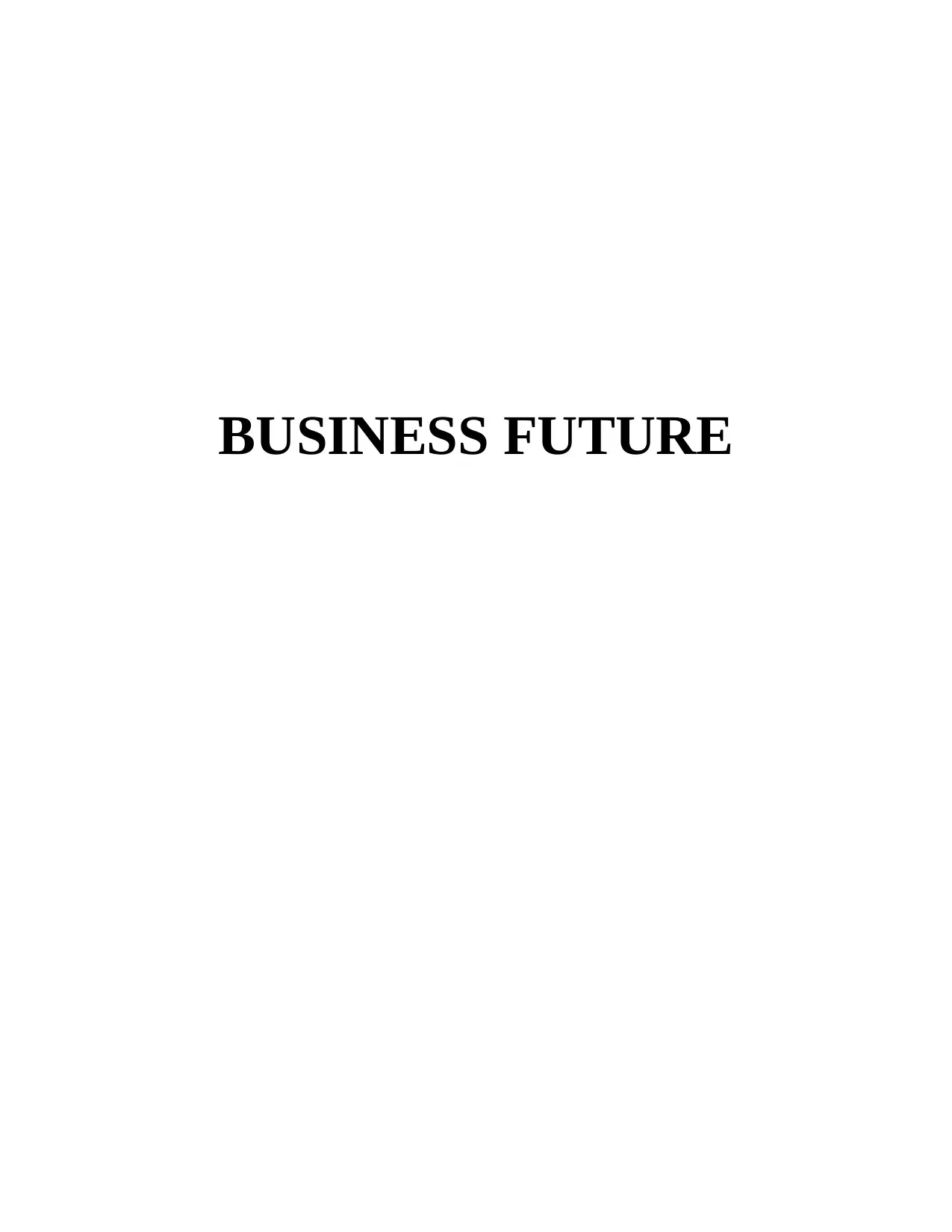
BUSINESS FUTURE
Secure Best Marks with AI Grader
Need help grading? Try our AI Grader for instant feedback on your assignments.
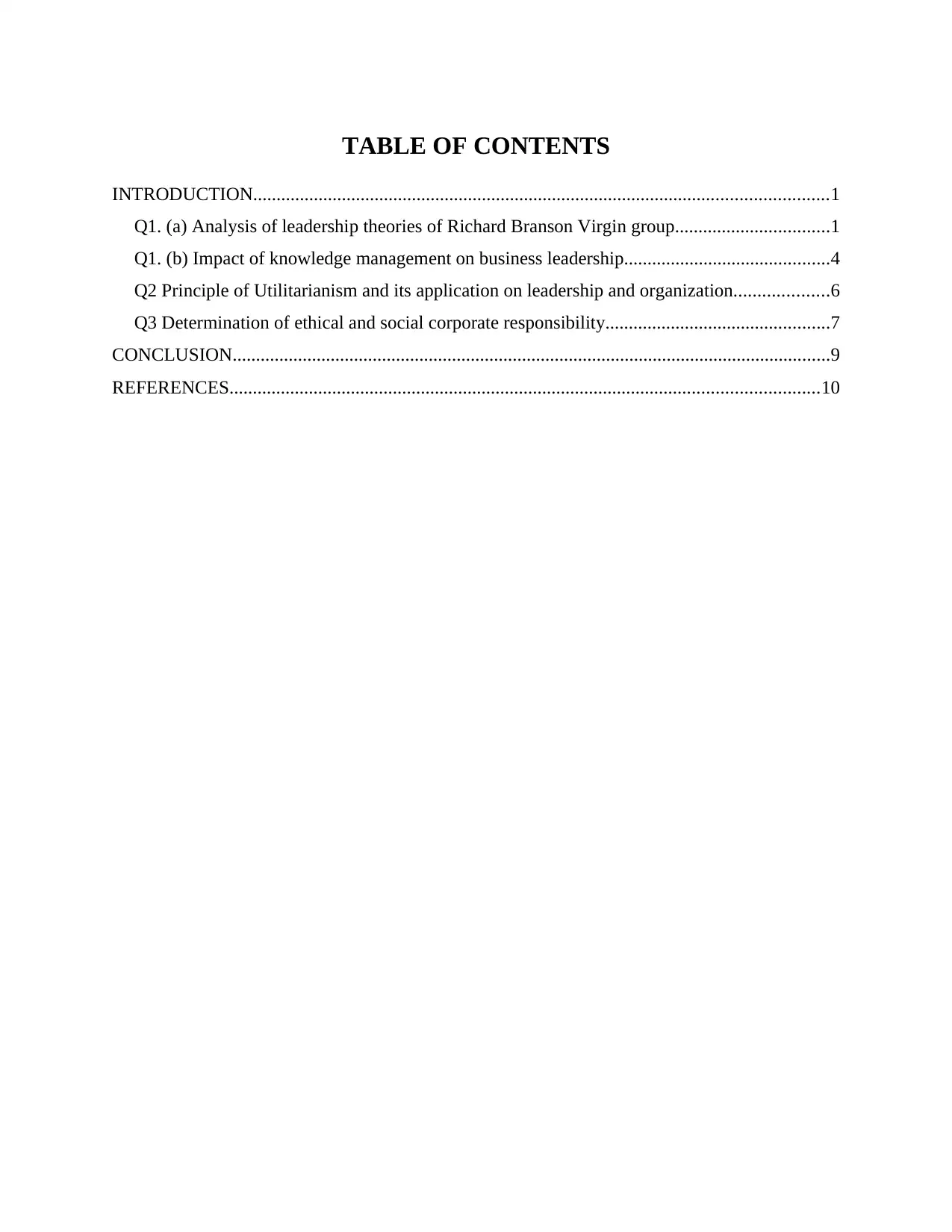
TABLE OF CONTENTS
INTRODUCTION...........................................................................................................................1
Q1. (a) Analysis of leadership theories of Richard Branson Virgin group.................................1
Q1. (b) Impact of knowledge management on business leadership............................................4
Q2 Principle of Utilitarianism and its application on leadership and organization....................6
Q3 Determination of ethical and social corporate responsibility................................................7
CONCLUSION................................................................................................................................9
REFERENCES..............................................................................................................................10
INTRODUCTION...........................................................................................................................1
Q1. (a) Analysis of leadership theories of Richard Branson Virgin group.................................1
Q1. (b) Impact of knowledge management on business leadership............................................4
Q2 Principle of Utilitarianism and its application on leadership and organization....................6
Q3 Determination of ethical and social corporate responsibility................................................7
CONCLUSION................................................................................................................................9
REFERENCES..............................................................................................................................10
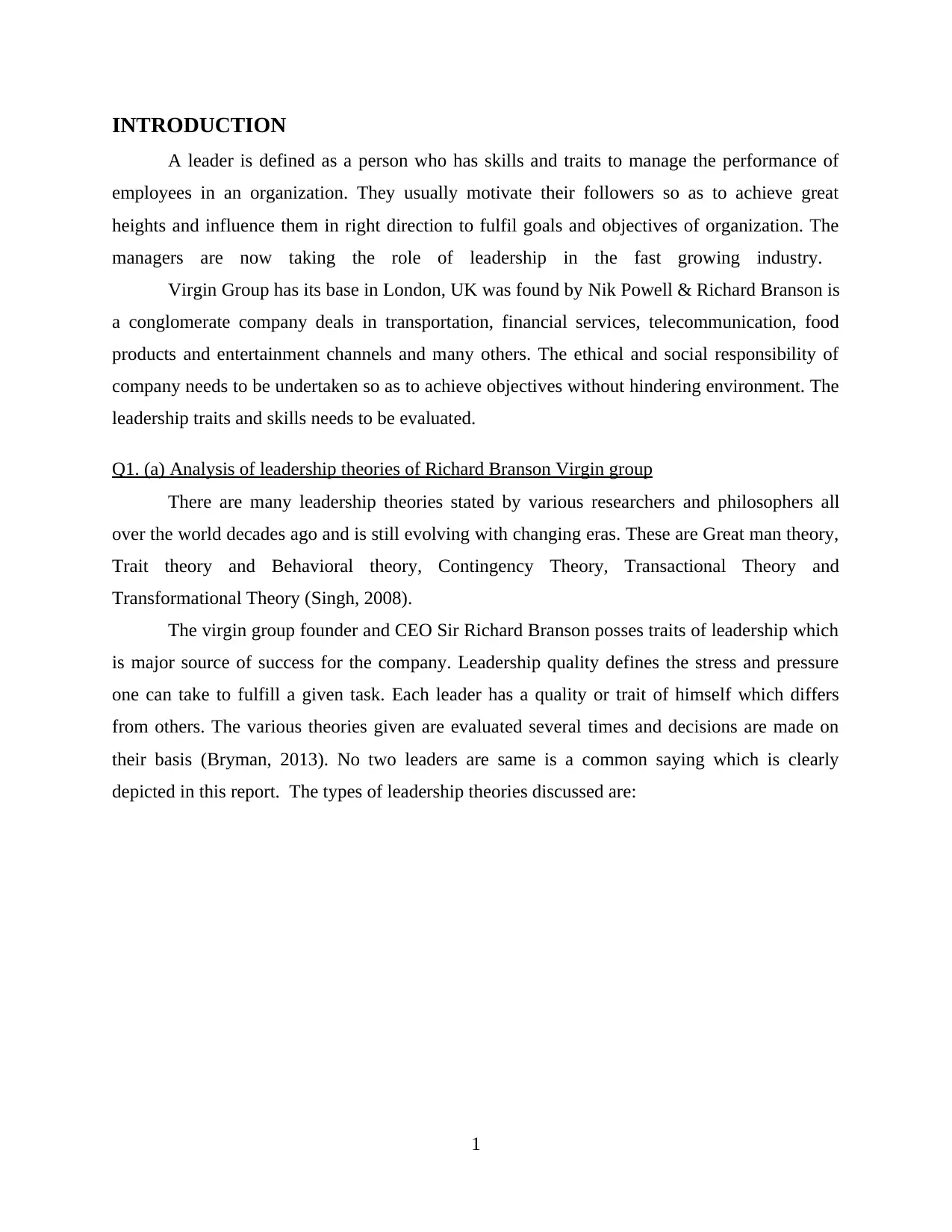
INTRODUCTION
A leader is defined as a person who has skills and traits to manage the performance of
employees in an organization. They usually motivate their followers so as to achieve great
heights and influence them in right direction to fulfil goals and objectives of organization. The
managers are now taking the role of leadership in the fast growing industry.
Virgin Group has its base in London, UK was found by Nik Powell & Richard Branson is
a conglomerate company deals in transportation, financial services, telecommunication, food
products and entertainment channels and many others. The ethical and social responsibility of
company needs to be undertaken so as to achieve objectives without hindering environment. The
leadership traits and skills needs to be evaluated.
Q1. (a) Analysis of leadership theories of Richard Branson Virgin group
There are many leadership theories stated by various researchers and philosophers all
over the world decades ago and is still evolving with changing eras. These are Great man theory,
Trait theory and Behavioral theory, Contingency Theory, Transactional Theory and
Transformational Theory (Singh, 2008).
The virgin group founder and CEO Sir Richard Branson posses traits of leadership which
is major source of success for the company. Leadership quality defines the stress and pressure
one can take to fulfill a given task. Each leader has a quality or trait of himself which differs
from others. The various theories given are evaluated several times and decisions are made on
their basis (Bryman, 2013). No two leaders are same is a common saying which is clearly
depicted in this report. The types of leadership theories discussed are:
1
A leader is defined as a person who has skills and traits to manage the performance of
employees in an organization. They usually motivate their followers so as to achieve great
heights and influence them in right direction to fulfil goals and objectives of organization. The
managers are now taking the role of leadership in the fast growing industry.
Virgin Group has its base in London, UK was found by Nik Powell & Richard Branson is
a conglomerate company deals in transportation, financial services, telecommunication, food
products and entertainment channels and many others. The ethical and social responsibility of
company needs to be undertaken so as to achieve objectives without hindering environment. The
leadership traits and skills needs to be evaluated.
Q1. (a) Analysis of leadership theories of Richard Branson Virgin group
There are many leadership theories stated by various researchers and philosophers all
over the world decades ago and is still evolving with changing eras. These are Great man theory,
Trait theory and Behavioral theory, Contingency Theory, Transactional Theory and
Transformational Theory (Singh, 2008).
The virgin group founder and CEO Sir Richard Branson posses traits of leadership which
is major source of success for the company. Leadership quality defines the stress and pressure
one can take to fulfill a given task. Each leader has a quality or trait of himself which differs
from others. The various theories given are evaluated several times and decisions are made on
their basis (Bryman, 2013). No two leaders are same is a common saying which is clearly
depicted in this report. The types of leadership theories discussed are:
1
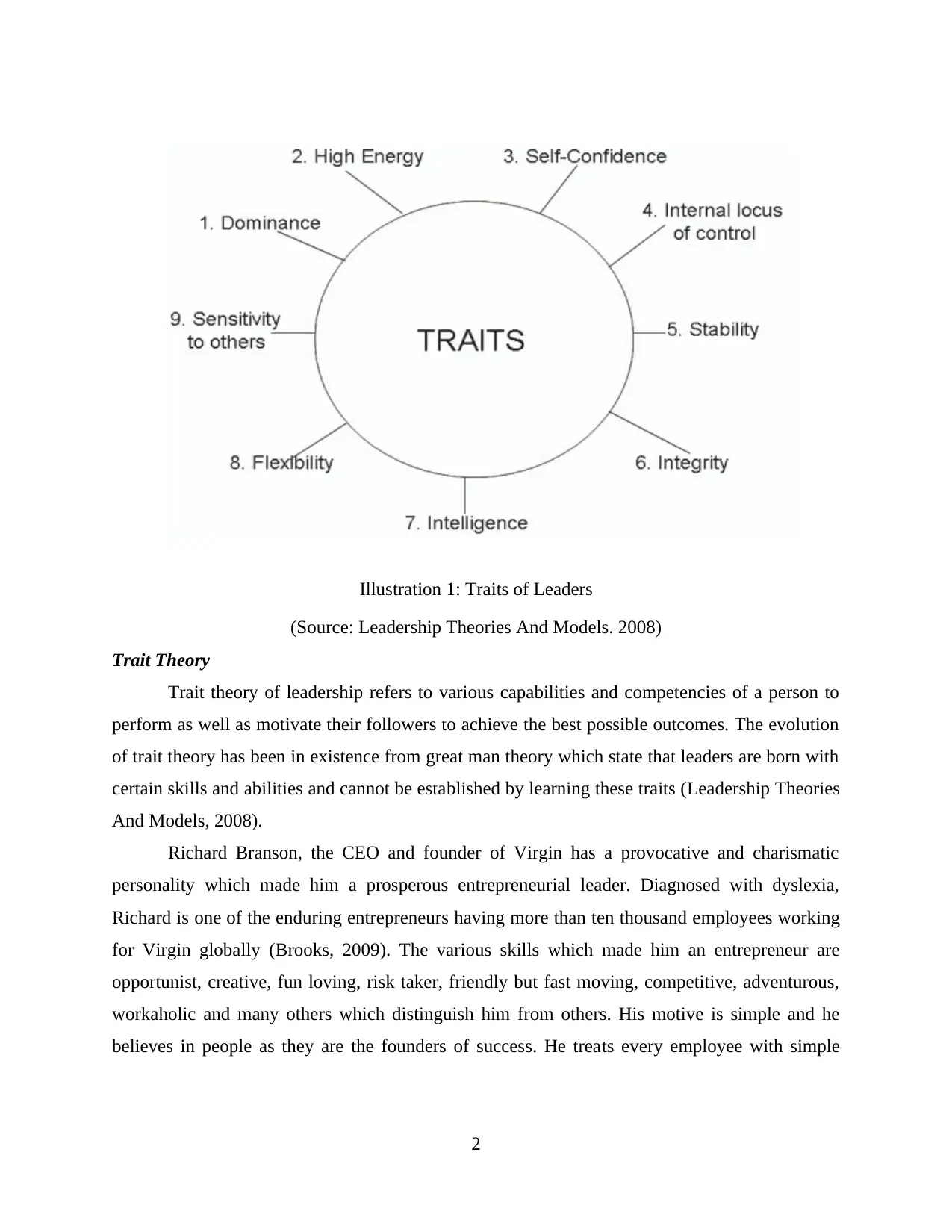
(Source: Leadership Theories And Models. 2008)
Trait Theory
Trait theory of leadership refers to various capabilities and competencies of a person to
perform as well as motivate their followers to achieve the best possible outcomes. The evolution
of trait theory has been in existence from great man theory which state that leaders are born with
certain skills and abilities and cannot be established by learning these traits (Leadership Theories
And Models, 2008).
Richard Branson, the CEO and founder of Virgin has a provocative and charismatic
personality which made him a prosperous entrepreneurial leader. Diagnosed with dyslexia,
Richard is one of the enduring entrepreneurs having more than ten thousand employees working
for Virgin globally (Brooks, 2009). The various skills which made him an entrepreneur are
opportunist, creative, fun loving, risk taker, friendly but fast moving, competitive, adventurous,
workaholic and many others which distinguish him from others. His motive is simple and he
believes in people as they are the founders of success. He treats every employee with simple
2
Illustration 1: Traits of Leaders
Trait Theory
Trait theory of leadership refers to various capabilities and competencies of a person to
perform as well as motivate their followers to achieve the best possible outcomes. The evolution
of trait theory has been in existence from great man theory which state that leaders are born with
certain skills and abilities and cannot be established by learning these traits (Leadership Theories
And Models, 2008).
Richard Branson, the CEO and founder of Virgin has a provocative and charismatic
personality which made him a prosperous entrepreneurial leader. Diagnosed with dyslexia,
Richard is one of the enduring entrepreneurs having more than ten thousand employees working
for Virgin globally (Brooks, 2009). The various skills which made him an entrepreneur are
opportunist, creative, fun loving, risk taker, friendly but fast moving, competitive, adventurous,
workaholic and many others which distinguish him from others. His motive is simple and he
believes in people as they are the founders of success. He treats every employee with simple
2
Illustration 1: Traits of Leaders
Secure Best Marks with AI Grader
Need help grading? Try our AI Grader for instant feedback on your assignments.
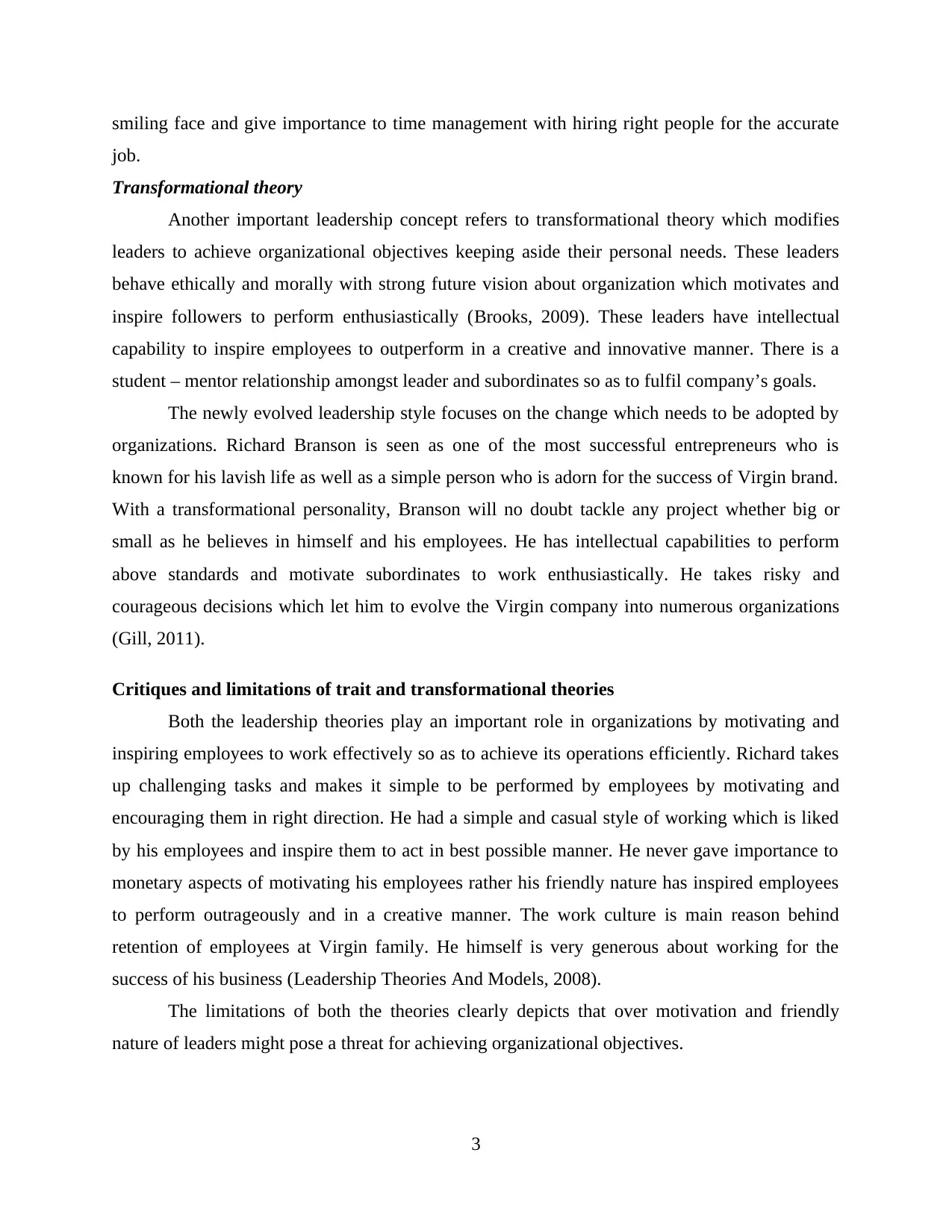
smiling face and give importance to time management with hiring right people for the accurate
job.
Transformational theory
Another important leadership concept refers to transformational theory which modifies
leaders to achieve organizational objectives keeping aside their personal needs. These leaders
behave ethically and morally with strong future vision about organization which motivates and
inspire followers to perform enthusiastically (Brooks, 2009). These leaders have intellectual
capability to inspire employees to outperform in a creative and innovative manner. There is a
student – mentor relationship amongst leader and subordinates so as to fulfil company’s goals.
The newly evolved leadership style focuses on the change which needs to be adopted by
organizations. Richard Branson is seen as one of the most successful entrepreneurs who is
known for his lavish life as well as a simple person who is adorn for the success of Virgin brand.
With a transformational personality, Branson will no doubt tackle any project whether big or
small as he believes in himself and his employees. He has intellectual capabilities to perform
above standards and motivate subordinates to work enthusiastically. He takes risky and
courageous decisions which let him to evolve the Virgin company into numerous organizations
(Gill, 2011).
Critiques and limitations of trait and transformational theories
Both the leadership theories play an important role in organizations by motivating and
inspiring employees to work effectively so as to achieve its operations efficiently. Richard takes
up challenging tasks and makes it simple to be performed by employees by motivating and
encouraging them in right direction. He had a simple and casual style of working which is liked
by his employees and inspire them to act in best possible manner. He never gave importance to
monetary aspects of motivating his employees rather his friendly nature has inspired employees
to perform outrageously and in a creative manner. The work culture is main reason behind
retention of employees at Virgin family. He himself is very generous about working for the
success of his business (Leadership Theories And Models, 2008).
The limitations of both the theories clearly depicts that over motivation and friendly
nature of leaders might pose a threat for achieving organizational objectives.
3
job.
Transformational theory
Another important leadership concept refers to transformational theory which modifies
leaders to achieve organizational objectives keeping aside their personal needs. These leaders
behave ethically and morally with strong future vision about organization which motivates and
inspire followers to perform enthusiastically (Brooks, 2009). These leaders have intellectual
capability to inspire employees to outperform in a creative and innovative manner. There is a
student – mentor relationship amongst leader and subordinates so as to fulfil company’s goals.
The newly evolved leadership style focuses on the change which needs to be adopted by
organizations. Richard Branson is seen as one of the most successful entrepreneurs who is
known for his lavish life as well as a simple person who is adorn for the success of Virgin brand.
With a transformational personality, Branson will no doubt tackle any project whether big or
small as he believes in himself and his employees. He has intellectual capabilities to perform
above standards and motivate subordinates to work enthusiastically. He takes risky and
courageous decisions which let him to evolve the Virgin company into numerous organizations
(Gill, 2011).
Critiques and limitations of trait and transformational theories
Both the leadership theories play an important role in organizations by motivating and
inspiring employees to work effectively so as to achieve its operations efficiently. Richard takes
up challenging tasks and makes it simple to be performed by employees by motivating and
encouraging them in right direction. He had a simple and casual style of working which is liked
by his employees and inspire them to act in best possible manner. He never gave importance to
monetary aspects of motivating his employees rather his friendly nature has inspired employees
to perform outrageously and in a creative manner. The work culture is main reason behind
retention of employees at Virgin family. He himself is very generous about working for the
success of his business (Leadership Theories And Models, 2008).
The limitations of both the theories clearly depicts that over motivation and friendly
nature of leaders might pose a threat for achieving organizational objectives.
3
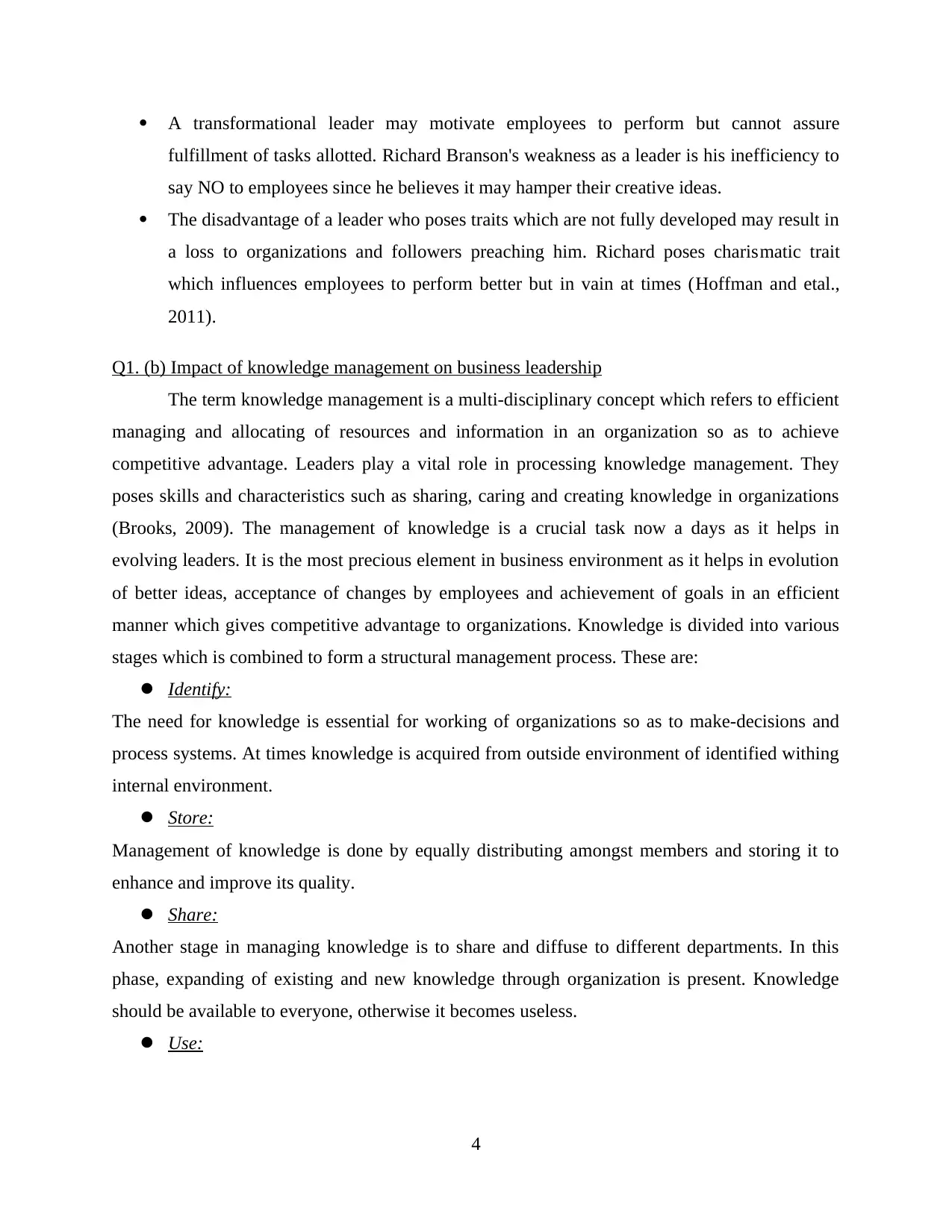
A transformational leader may motivate employees to perform but cannot assure
fulfillment of tasks allotted. Richard Branson's weakness as a leader is his inefficiency to
say NO to employees since he believes it may hamper their creative ideas.
The disadvantage of a leader who poses traits which are not fully developed may result in
a loss to organizations and followers preaching him. Richard poses charismatic trait
which influences employees to perform better but in vain at times (Hoffman and etal.,
2011).
Q1. (b) Impact of knowledge management on business leadership
The term knowledge management is a multi-disciplinary concept which refers to efficient
managing and allocating of resources and information in an organization so as to achieve
competitive advantage. Leaders play a vital role in processing knowledge management. They
poses skills and characteristics such as sharing, caring and creating knowledge in organizations
(Brooks, 2009). The management of knowledge is a crucial task now a days as it helps in
evolving leaders. It is the most precious element in business environment as it helps in evolution
of better ideas, acceptance of changes by employees and achievement of goals in an efficient
manner which gives competitive advantage to organizations. Knowledge is divided into various
stages which is combined to form a structural management process. These are:
Identify:
The need for knowledge is essential for working of organizations so as to make-decisions and
process systems. At times knowledge is acquired from outside environment of identified withing
internal environment.
Store:
Management of knowledge is done by equally distributing amongst members and storing it to
enhance and improve its quality.
Share:
Another stage in managing knowledge is to share and diffuse to different departments. In this
phase, expanding of existing and new knowledge through organization is present. Knowledge
should be available to everyone, otherwise it becomes useless.
Use:
4
fulfillment of tasks allotted. Richard Branson's weakness as a leader is his inefficiency to
say NO to employees since he believes it may hamper their creative ideas.
The disadvantage of a leader who poses traits which are not fully developed may result in
a loss to organizations and followers preaching him. Richard poses charismatic trait
which influences employees to perform better but in vain at times (Hoffman and etal.,
2011).
Q1. (b) Impact of knowledge management on business leadership
The term knowledge management is a multi-disciplinary concept which refers to efficient
managing and allocating of resources and information in an organization so as to achieve
competitive advantage. Leaders play a vital role in processing knowledge management. They
poses skills and characteristics such as sharing, caring and creating knowledge in organizations
(Brooks, 2009). The management of knowledge is a crucial task now a days as it helps in
evolving leaders. It is the most precious element in business environment as it helps in evolution
of better ideas, acceptance of changes by employees and achievement of goals in an efficient
manner which gives competitive advantage to organizations. Knowledge is divided into various
stages which is combined to form a structural management process. These are:
Identify:
The need for knowledge is essential for working of organizations so as to make-decisions and
process systems. At times knowledge is acquired from outside environment of identified withing
internal environment.
Store:
Management of knowledge is done by equally distributing amongst members and storing it to
enhance and improve its quality.
Share:
Another stage in managing knowledge is to share and diffuse to different departments. In this
phase, expanding of existing and new knowledge through organization is present. Knowledge
should be available to everyone, otherwise it becomes useless.
Use:
4
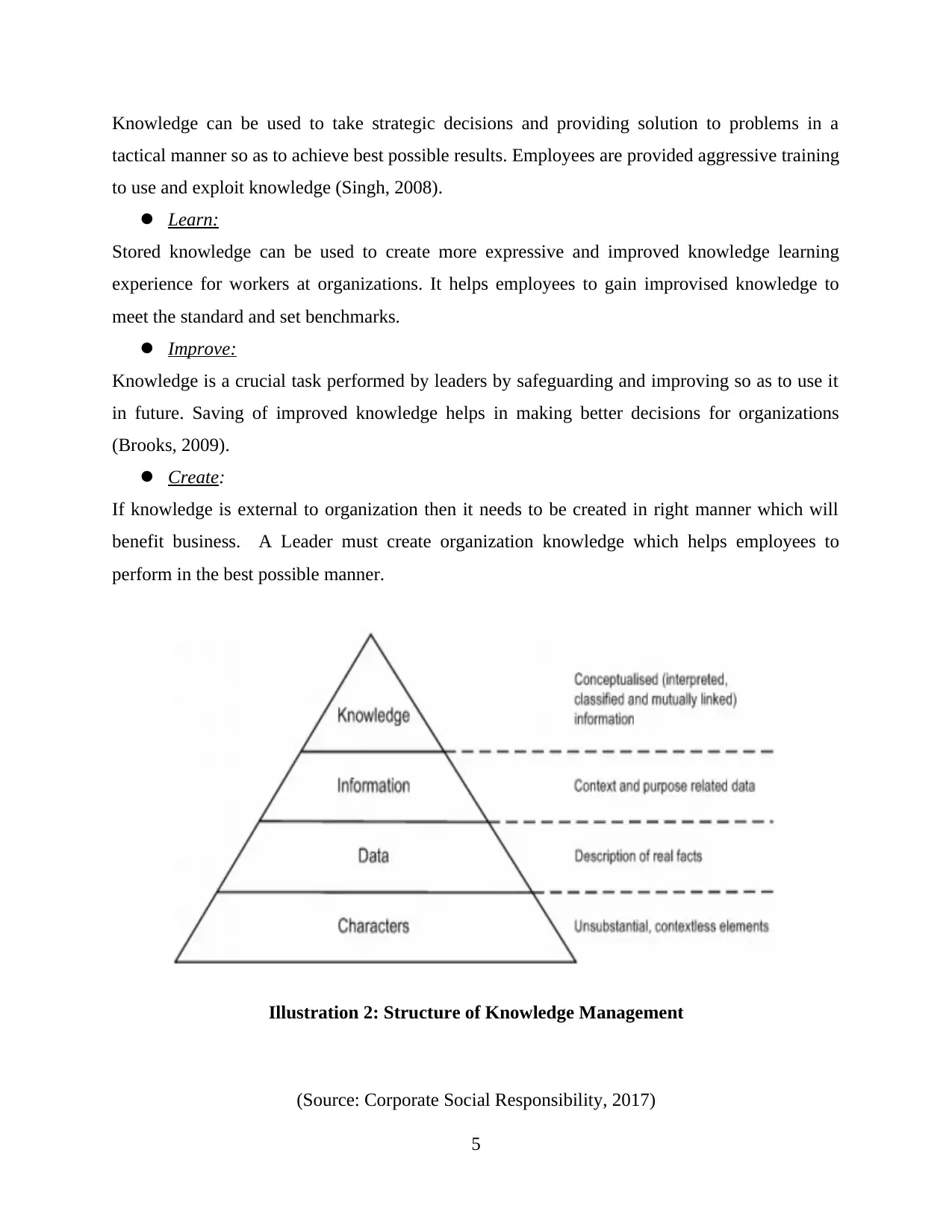
Knowledge can be used to take strategic decisions and providing solution to problems in a
tactical manner so as to achieve best possible results. Employees are provided aggressive training
to use and exploit knowledge (Singh, 2008).
Learn:
Stored knowledge can be used to create more expressive and improved knowledge learning
experience for workers at organizations. It helps employees to gain improvised knowledge to
meet the standard and set benchmarks.
Improve:
Knowledge is a crucial task performed by leaders by safeguarding and improving so as to use it
in future. Saving of improved knowledge helps in making better decisions for organizations
(Brooks, 2009).
Create:
If knowledge is external to organization then it needs to be created in right manner which will
benefit business. A Leader must create organization knowledge which helps employees to
perform in the best possible manner.
(Source: Corporate Social Responsibility, 2017)
5
Illustration 2: Structure of Knowledge Management
tactical manner so as to achieve best possible results. Employees are provided aggressive training
to use and exploit knowledge (Singh, 2008).
Learn:
Stored knowledge can be used to create more expressive and improved knowledge learning
experience for workers at organizations. It helps employees to gain improvised knowledge to
meet the standard and set benchmarks.
Improve:
Knowledge is a crucial task performed by leaders by safeguarding and improving so as to use it
in future. Saving of improved knowledge helps in making better decisions for organizations
(Brooks, 2009).
Create:
If knowledge is external to organization then it needs to be created in right manner which will
benefit business. A Leader must create organization knowledge which helps employees to
perform in the best possible manner.
(Source: Corporate Social Responsibility, 2017)
5
Illustration 2: Structure of Knowledge Management
Paraphrase This Document
Need a fresh take? Get an instant paraphrase of this document with our AI Paraphraser
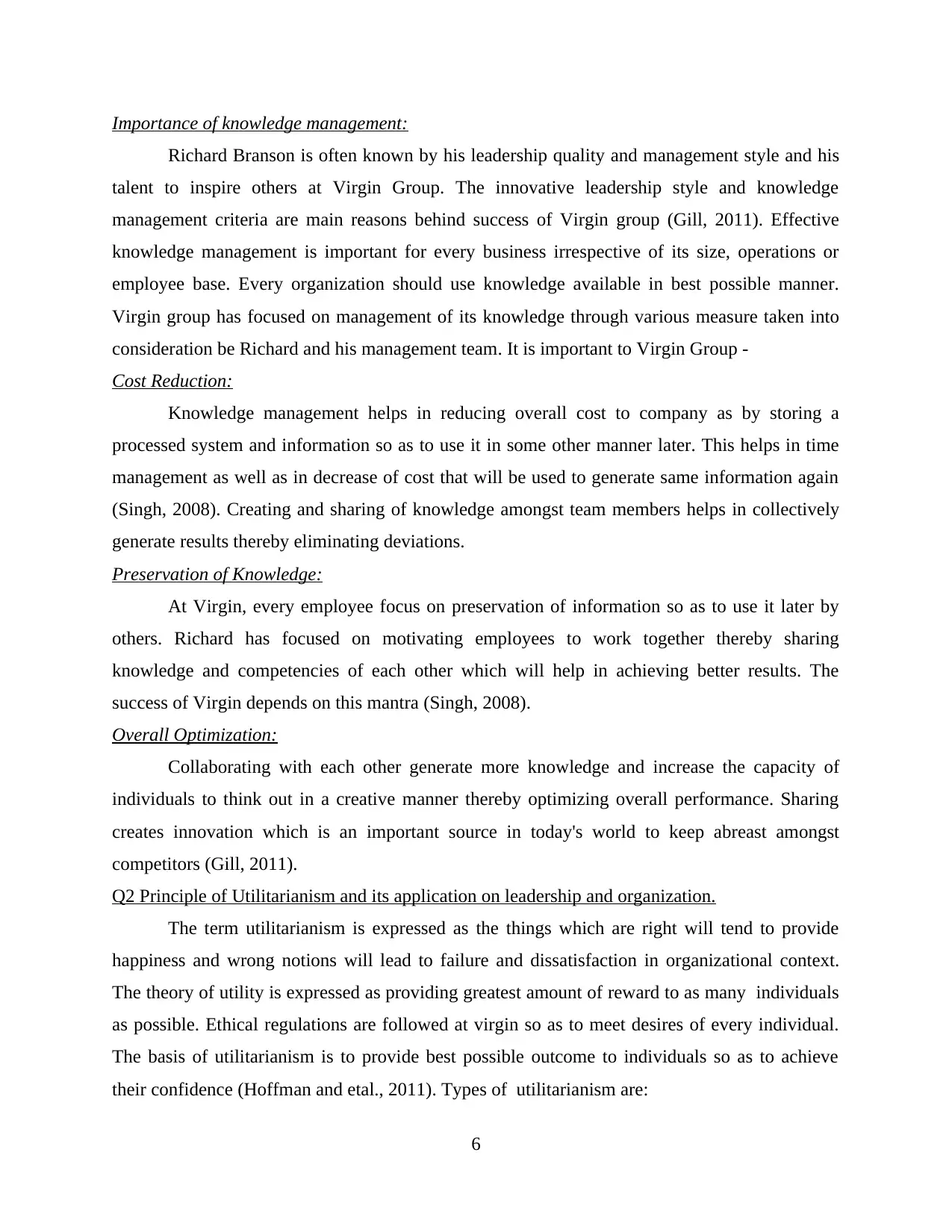
Importance of knowledge management:
Richard Branson is often known by his leadership quality and management style and his
talent to inspire others at Virgin Group. The innovative leadership style and knowledge
management criteria are main reasons behind success of Virgin group (Gill, 2011). Effective
knowledge management is important for every business irrespective of its size, operations or
employee base. Every organization should use knowledge available in best possible manner.
Virgin group has focused on management of its knowledge through various measure taken into
consideration be Richard and his management team. It is important to Virgin Group -
Cost Reduction:
Knowledge management helps in reducing overall cost to company as by storing a
processed system and information so as to use it in some other manner later. This helps in time
management as well as in decrease of cost that will be used to generate same information again
(Singh, 2008). Creating and sharing of knowledge amongst team members helps in collectively
generate results thereby eliminating deviations.
Preservation of Knowledge:
At Virgin, every employee focus on preservation of information so as to use it later by
others. Richard has focused on motivating employees to work together thereby sharing
knowledge and competencies of each other which will help in achieving better results. The
success of Virgin depends on this mantra (Singh, 2008).
Overall Optimization:
Collaborating with each other generate more knowledge and increase the capacity of
individuals to think out in a creative manner thereby optimizing overall performance. Sharing
creates innovation which is an important source in today's world to keep abreast amongst
competitors (Gill, 2011).
Q2 Principle of Utilitarianism and its application on leadership and organization.
The term utilitarianism is expressed as the things which are right will tend to provide
happiness and wrong notions will lead to failure and dissatisfaction in organizational context.
The theory of utility is expressed as providing greatest amount of reward to as many individuals
as possible. Ethical regulations are followed at virgin so as to meet desires of every individual.
The basis of utilitarianism is to provide best possible outcome to individuals so as to achieve
their confidence (Hoffman and etal., 2011). Types of utilitarianism are:
6
Richard Branson is often known by his leadership quality and management style and his
talent to inspire others at Virgin Group. The innovative leadership style and knowledge
management criteria are main reasons behind success of Virgin group (Gill, 2011). Effective
knowledge management is important for every business irrespective of its size, operations or
employee base. Every organization should use knowledge available in best possible manner.
Virgin group has focused on management of its knowledge through various measure taken into
consideration be Richard and his management team. It is important to Virgin Group -
Cost Reduction:
Knowledge management helps in reducing overall cost to company as by storing a
processed system and information so as to use it in some other manner later. This helps in time
management as well as in decrease of cost that will be used to generate same information again
(Singh, 2008). Creating and sharing of knowledge amongst team members helps in collectively
generate results thereby eliminating deviations.
Preservation of Knowledge:
At Virgin, every employee focus on preservation of information so as to use it later by
others. Richard has focused on motivating employees to work together thereby sharing
knowledge and competencies of each other which will help in achieving better results. The
success of Virgin depends on this mantra (Singh, 2008).
Overall Optimization:
Collaborating with each other generate more knowledge and increase the capacity of
individuals to think out in a creative manner thereby optimizing overall performance. Sharing
creates innovation which is an important source in today's world to keep abreast amongst
competitors (Gill, 2011).
Q2 Principle of Utilitarianism and its application on leadership and organization.
The term utilitarianism is expressed as the things which are right will tend to provide
happiness and wrong notions will lead to failure and dissatisfaction in organizational context.
The theory of utility is expressed as providing greatest amount of reward to as many individuals
as possible. Ethical regulations are followed at virgin so as to meet desires of every individual.
The basis of utilitarianism is to provide best possible outcome to individuals so as to achieve
their confidence (Hoffman and etal., 2011). Types of utilitarianism are:
6
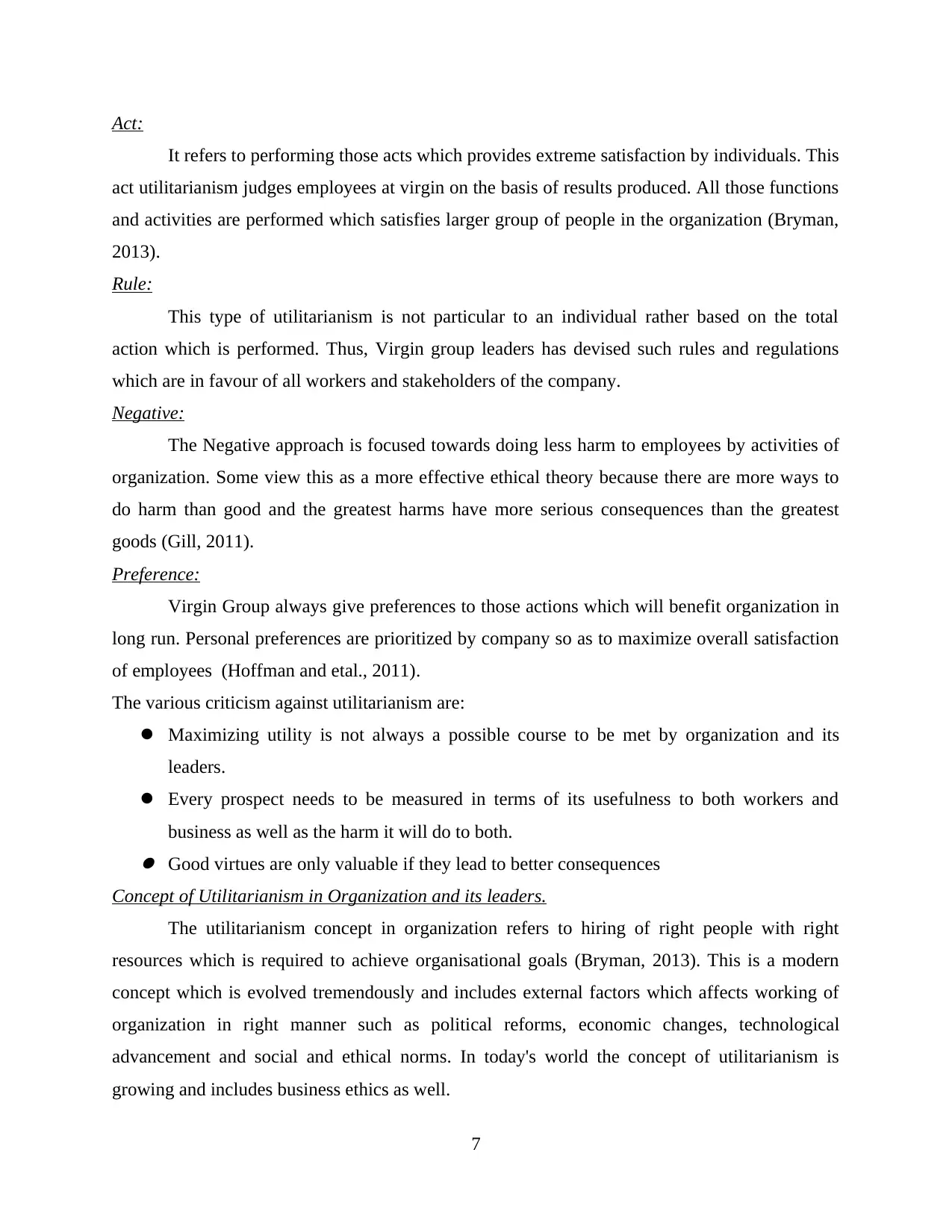
Act:
It refers to performing those acts which provides extreme satisfaction by individuals. This
act utilitarianism judges employees at virgin on the basis of results produced. All those functions
and activities are performed which satisfies larger group of people in the organization (Bryman,
2013).
Rule:
This type of utilitarianism is not particular to an individual rather based on the total
action which is performed. Thus, Virgin group leaders has devised such rules and regulations
which are in favour of all workers and stakeholders of the company.
Negative:
The Negative approach is focused towards doing less harm to employees by activities of
organization. Some view this as a more effective ethical theory because there are more ways to
do harm than good and the greatest harms have more serious consequences than the greatest
goods (Gill, 2011).
Preference:
Virgin Group always give preferences to those actions which will benefit organization in
long run. Personal preferences are prioritized by company so as to maximize overall satisfaction
of employees (Hoffman and etal., 2011).
The various criticism against utilitarianism are:
Maximizing utility is not always a possible course to be met by organization and its
leaders.
Every prospect needs to be measured in terms of its usefulness to both workers and
business as well as the harm it will do to both. Good virtues are only valuable if they lead to better consequences
Concept of Utilitarianism in Organization and its leaders.
The utilitarianism concept in organization refers to hiring of right people with right
resources which is required to achieve organisational goals (Bryman, 2013). This is a modern
concept which is evolved tremendously and includes external factors which affects working of
organization in right manner such as political reforms, economic changes, technological
advancement and social and ethical norms. In today's world the concept of utilitarianism is
growing and includes business ethics as well.
7
It refers to performing those acts which provides extreme satisfaction by individuals. This
act utilitarianism judges employees at virgin on the basis of results produced. All those functions
and activities are performed which satisfies larger group of people in the organization (Bryman,
2013).
Rule:
This type of utilitarianism is not particular to an individual rather based on the total
action which is performed. Thus, Virgin group leaders has devised such rules and regulations
which are in favour of all workers and stakeholders of the company.
Negative:
The Negative approach is focused towards doing less harm to employees by activities of
organization. Some view this as a more effective ethical theory because there are more ways to
do harm than good and the greatest harms have more serious consequences than the greatest
goods (Gill, 2011).
Preference:
Virgin Group always give preferences to those actions which will benefit organization in
long run. Personal preferences are prioritized by company so as to maximize overall satisfaction
of employees (Hoffman and etal., 2011).
The various criticism against utilitarianism are:
Maximizing utility is not always a possible course to be met by organization and its
leaders.
Every prospect needs to be measured in terms of its usefulness to both workers and
business as well as the harm it will do to both. Good virtues are only valuable if they lead to better consequences
Concept of Utilitarianism in Organization and its leaders.
The utilitarianism concept in organization refers to hiring of right people with right
resources which is required to achieve organisational goals (Bryman, 2013). This is a modern
concept which is evolved tremendously and includes external factors which affects working of
organization in right manner such as political reforms, economic changes, technological
advancement and social and ethical norms. In today's world the concept of utilitarianism is
growing and includes business ethics as well.
7
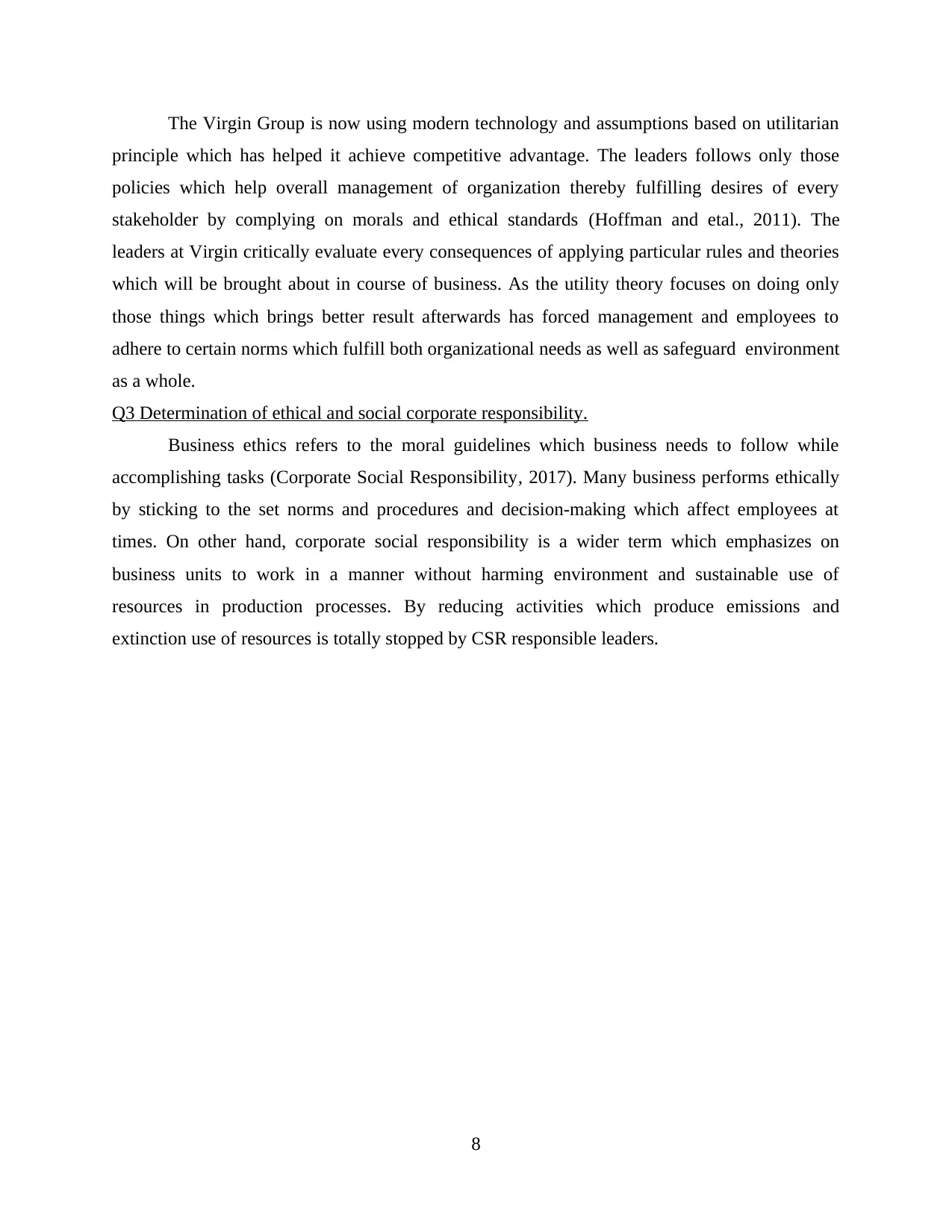
The Virgin Group is now using modern technology and assumptions based on utilitarian
principle which has helped it achieve competitive advantage. The leaders follows only those
policies which help overall management of organization thereby fulfilling desires of every
stakeholder by complying on morals and ethical standards (Hoffman and etal., 2011). The
leaders at Virgin critically evaluate every consequences of applying particular rules and theories
which will be brought about in course of business. As the utility theory focuses on doing only
those things which brings better result afterwards has forced management and employees to
adhere to certain norms which fulfill both organizational needs as well as safeguard environment
as a whole.
Q3 Determination of ethical and social corporate responsibility.
Business ethics refers to the moral guidelines which business needs to follow while
accomplishing tasks (Corporate Social Responsibility, 2017). Many business performs ethically
by sticking to the set norms and procedures and decision-making which affect employees at
times. On other hand, corporate social responsibility is a wider term which emphasizes on
business units to work in a manner without harming environment and sustainable use of
resources in production processes. By reducing activities which produce emissions and
extinction use of resources is totally stopped by CSR responsible leaders.
8
principle which has helped it achieve competitive advantage. The leaders follows only those
policies which help overall management of organization thereby fulfilling desires of every
stakeholder by complying on morals and ethical standards (Hoffman and etal., 2011). The
leaders at Virgin critically evaluate every consequences of applying particular rules and theories
which will be brought about in course of business. As the utility theory focuses on doing only
those things which brings better result afterwards has forced management and employees to
adhere to certain norms which fulfill both organizational needs as well as safeguard environment
as a whole.
Q3 Determination of ethical and social corporate responsibility.
Business ethics refers to the moral guidelines which business needs to follow while
accomplishing tasks (Corporate Social Responsibility, 2017). Many business performs ethically
by sticking to the set norms and procedures and decision-making which affect employees at
times. On other hand, corporate social responsibility is a wider term which emphasizes on
business units to work in a manner without harming environment and sustainable use of
resources in production processes. By reducing activities which produce emissions and
extinction use of resources is totally stopped by CSR responsible leaders.
8
Secure Best Marks with AI Grader
Need help grading? Try our AI Grader for instant feedback on your assignments.
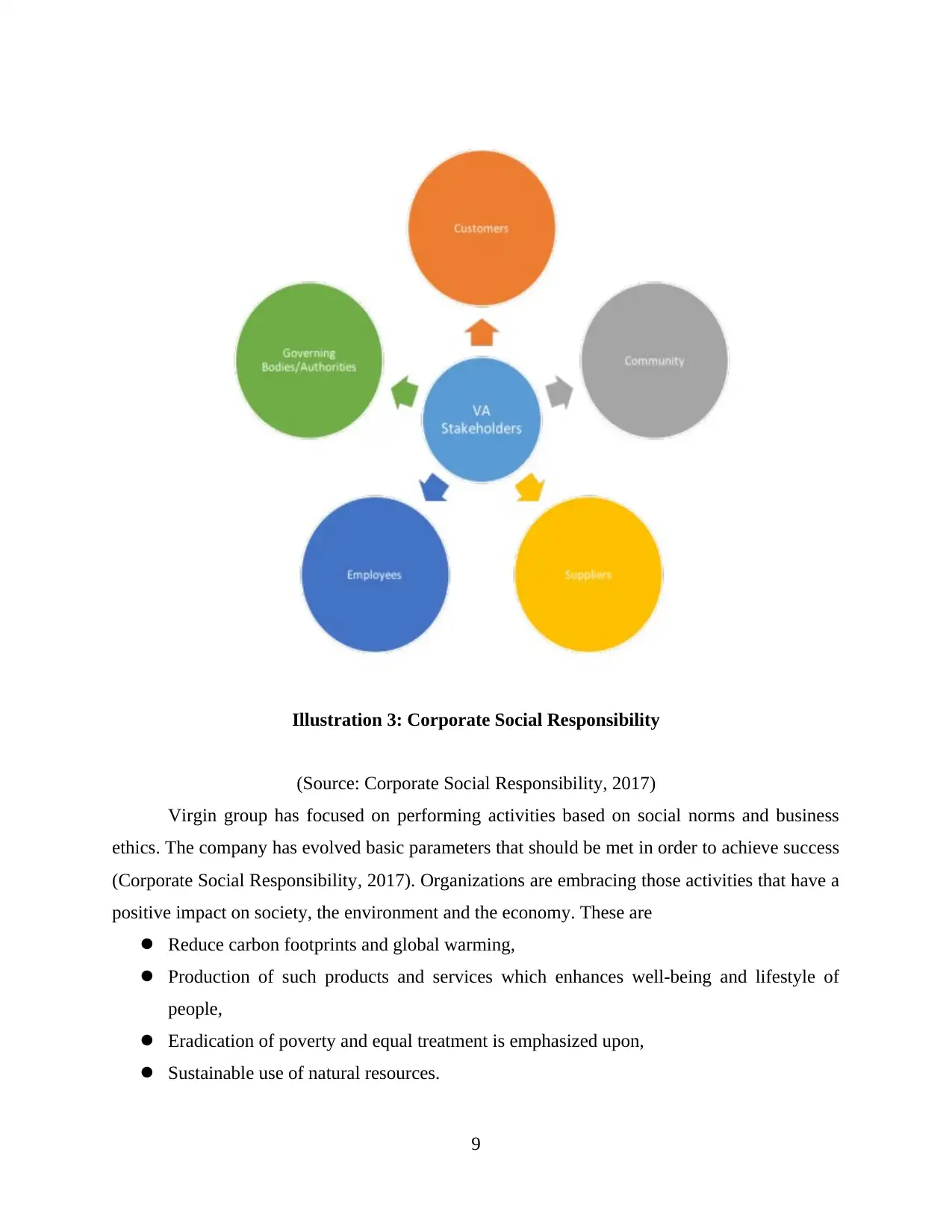
(Source: Corporate Social Responsibility, 2017)
Virgin group has focused on performing activities based on social norms and business
ethics. The company has evolved basic parameters that should be met in order to achieve success
(Corporate Social Responsibility, 2017). Organizations are embracing those activities that have a
positive impact on society, the environment and the economy. These are
Reduce carbon footprints and global warming,
Production of such products and services which enhances well-being and lifestyle of
people,
Eradication of poverty and equal treatment is emphasized upon,
Sustainable use of natural resources.
9
Illustration 3: Corporate Social Responsibility
Virgin group has focused on performing activities based on social norms and business
ethics. The company has evolved basic parameters that should be met in order to achieve success
(Corporate Social Responsibility, 2017). Organizations are embracing those activities that have a
positive impact on society, the environment and the economy. These are
Reduce carbon footprints and global warming,
Production of such products and services which enhances well-being and lifestyle of
people,
Eradication of poverty and equal treatment is emphasized upon,
Sustainable use of natural resources.
9
Illustration 3: Corporate Social Responsibility
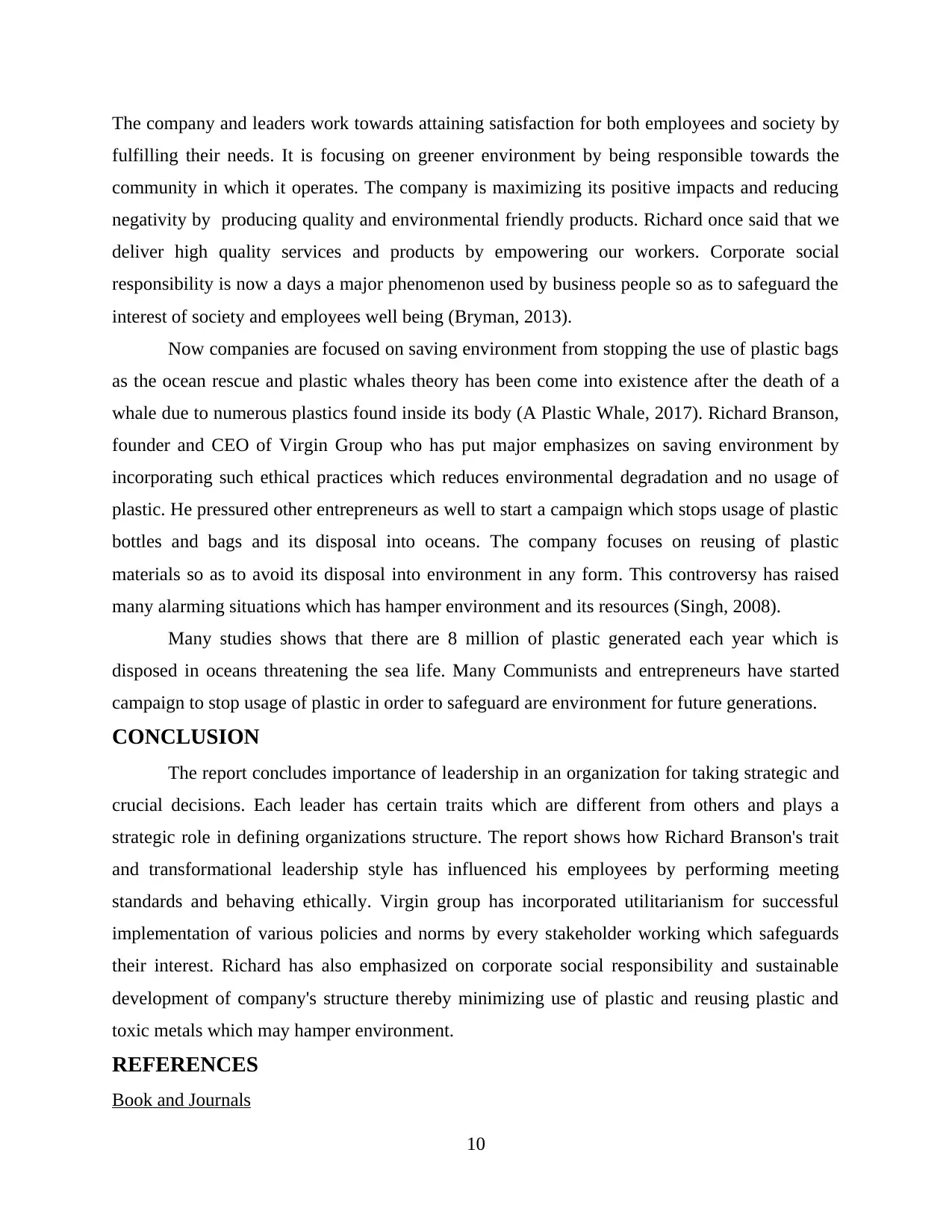
The company and leaders work towards attaining satisfaction for both employees and society by
fulfilling their needs. It is focusing on greener environment by being responsible towards the
community in which it operates. The company is maximizing its positive impacts and reducing
negativity by producing quality and environmental friendly products. Richard once said that we
deliver high quality services and products by empowering our workers. Corporate social
responsibility is now a days a major phenomenon used by business people so as to safeguard the
interest of society and employees well being (Bryman, 2013).
Now companies are focused on saving environment from stopping the use of plastic bags
as the ocean rescue and plastic whales theory has been come into existence after the death of a
whale due to numerous plastics found inside its body (A Plastic Whale, 2017). Richard Branson,
founder and CEO of Virgin Group who has put major emphasizes on saving environment by
incorporating such ethical practices which reduces environmental degradation and no usage of
plastic. He pressured other entrepreneurs as well to start a campaign which stops usage of plastic
bottles and bags and its disposal into oceans. The company focuses on reusing of plastic
materials so as to avoid its disposal into environment in any form. This controversy has raised
many alarming situations which has hamper environment and its resources (Singh, 2008).
Many studies shows that there are 8 million of plastic generated each year which is
disposed in oceans threatening the sea life. Many Communists and entrepreneurs have started
campaign to stop usage of plastic in order to safeguard are environment for future generations.
CONCLUSION
The report concludes importance of leadership in an organization for taking strategic and
crucial decisions. Each leader has certain traits which are different from others and plays a
strategic role in defining organizations structure. The report shows how Richard Branson's trait
and transformational leadership style has influenced his employees by performing meeting
standards and behaving ethically. Virgin group has incorporated utilitarianism for successful
implementation of various policies and norms by every stakeholder working which safeguards
their interest. Richard has also emphasized on corporate social responsibility and sustainable
development of company's structure thereby minimizing use of plastic and reusing plastic and
toxic metals which may hamper environment.
REFERENCES
Book and Journals
10
fulfilling their needs. It is focusing on greener environment by being responsible towards the
community in which it operates. The company is maximizing its positive impacts and reducing
negativity by producing quality and environmental friendly products. Richard once said that we
deliver high quality services and products by empowering our workers. Corporate social
responsibility is now a days a major phenomenon used by business people so as to safeguard the
interest of society and employees well being (Bryman, 2013).
Now companies are focused on saving environment from stopping the use of plastic bags
as the ocean rescue and plastic whales theory has been come into existence after the death of a
whale due to numerous plastics found inside its body (A Plastic Whale, 2017). Richard Branson,
founder and CEO of Virgin Group who has put major emphasizes on saving environment by
incorporating such ethical practices which reduces environmental degradation and no usage of
plastic. He pressured other entrepreneurs as well to start a campaign which stops usage of plastic
bottles and bags and its disposal into oceans. The company focuses on reusing of plastic
materials so as to avoid its disposal into environment in any form. This controversy has raised
many alarming situations which has hamper environment and its resources (Singh, 2008).
Many studies shows that there are 8 million of plastic generated each year which is
disposed in oceans threatening the sea life. Many Communists and entrepreneurs have started
campaign to stop usage of plastic in order to safeguard are environment for future generations.
CONCLUSION
The report concludes importance of leadership in an organization for taking strategic and
crucial decisions. Each leader has certain traits which are different from others and plays a
strategic role in defining organizations structure. The report shows how Richard Branson's trait
and transformational leadership style has influenced his employees by performing meeting
standards and behaving ethically. Virgin group has incorporated utilitarianism for successful
implementation of various policies and norms by every stakeholder working which safeguards
their interest. Richard has also emphasized on corporate social responsibility and sustainable
development of company's structure thereby minimizing use of plastic and reusing plastic and
toxic metals which may hamper environment.
REFERENCES
Book and Journals
10
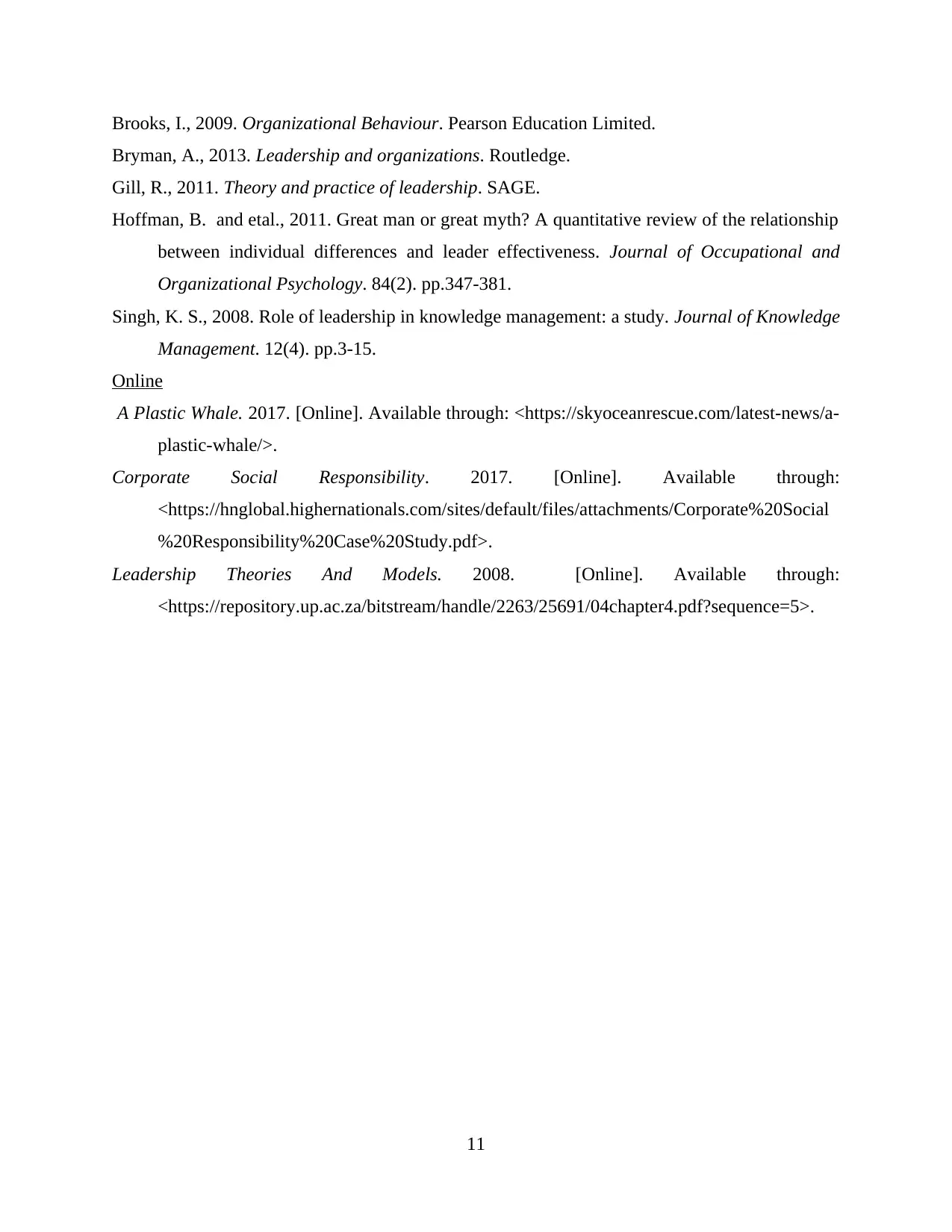
Brooks, I., 2009. Organizational Behaviour. Pearson Education Limited.
Bryman, A., 2013. Leadership and organizations. Routledge.
Gill, R., 2011. Theory and practice of leadership. SAGE.
Hoffman, B. and etal., 2011. Great man or great myth? A quantitative review of the relationship
between individual differences and leader effectiveness. Journal of Occupational and
Organizational Psychology. 84(2). pp.347-381.
Singh, K. S., 2008. Role of leadership in knowledge management: a study. Journal of Knowledge
Management. 12(4). pp.3-15.
Online
A Plastic Whale. 2017. [Online]. Available through: <https://skyoceanrescue.com/latest-news/a-
plastic-whale/>.
Corporate Social Responsibility. 2017. [Online]. Available through:
<https://hnglobal.highernationals.com/sites/default/files/attachments/Corporate%20Social
%20Responsibility%20Case%20Study.pdf>.
Leadership Theories And Models. 2008. [Online]. Available through:
<https://repository.up.ac.za/bitstream/handle/2263/25691/04chapter4.pdf?sequence=5>.
11
Bryman, A., 2013. Leadership and organizations. Routledge.
Gill, R., 2011. Theory and practice of leadership. SAGE.
Hoffman, B. and etal., 2011. Great man or great myth? A quantitative review of the relationship
between individual differences and leader effectiveness. Journal of Occupational and
Organizational Psychology. 84(2). pp.347-381.
Singh, K. S., 2008. Role of leadership in knowledge management: a study. Journal of Knowledge
Management. 12(4). pp.3-15.
Online
A Plastic Whale. 2017. [Online]. Available through: <https://skyoceanrescue.com/latest-news/a-
plastic-whale/>.
Corporate Social Responsibility. 2017. [Online]. Available through:
<https://hnglobal.highernationals.com/sites/default/files/attachments/Corporate%20Social
%20Responsibility%20Case%20Study.pdf>.
Leadership Theories And Models. 2008. [Online]. Available through:
<https://repository.up.ac.za/bitstream/handle/2263/25691/04chapter4.pdf?sequence=5>.
11
1 out of 13
Related Documents
Your All-in-One AI-Powered Toolkit for Academic Success.
+13062052269
info@desklib.com
Available 24*7 on WhatsApp / Email
![[object Object]](/_next/static/media/star-bottom.7253800d.svg)
Unlock your academic potential
© 2024 | Zucol Services PVT LTD | All rights reserved.





